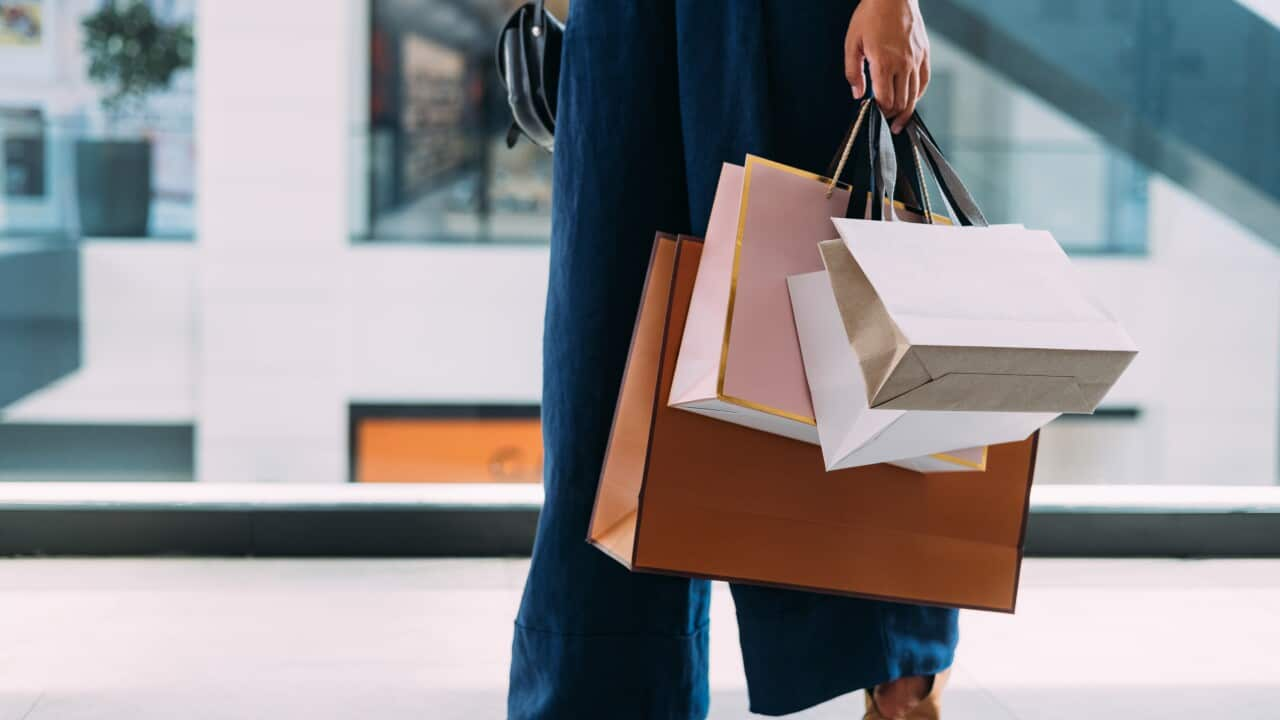Key Points
- Black Friday has not even arrived yet but many of the sales have already begun in Australia.
- Drastically reduced prices are tempting but influencers are questioning the value of people owning so much stuff.
- Australian consumers may be expected to spend big on Black Friday sales but some small businesses won't take part.
If you've checked your emails or scrolled through social media lately, you will likely have been bombarded with emails and ads about Black Friday sales.
As the fictional Australian character Darryl Kerrigan once proved, it can be hard to resist a bargain.
"If you get ‘em for half price, it’s a bargain,” he said in the film The Castle while considering the purchase of a secondhand pair of jousting sticks.
But while Black Friday and Cyber Monday sales seem to start earlier every year, encouraging Australians to potentially make even more purchases than the last, more content creators are turning to social media to discourage consumption.
When is Black Friday this year?
Black Friday sales originated in the United States, where businesses offered sales on the day after Thanksgiving.
Online retailers soon coined the term 'Cyber Monday' for sales offered on the following Monday.
This year, Black Friday falls on 29 November. But some brands appear to have started early.
Marketing and social media expert Meg Coffey, who lives in Perth but is originally from the US, said she finds it bizarre this sale has caught on in Australia.
"It used to be because malls were the only things open on the Friday after Thanksgiving, you've been cooped up inside and the only place you could go was the movies or the mall," she said.
"But Australia doesn’t even have Thanksgiving."
Coffey said she had noticed more online adverts and emails about Black Friday sales this year.
"They seem to have started at the beginning of November," she said.
Financial educator Serina Bird said she had noticed the sales were happening "earlier and earlier every year".
"It's quite phenomenal how this has really replaced the Boxing Day sales," she said.
She said the timing of Black Friday sales was just far enough from Christmas to avoid "a mad rush the week before" and meant items could be shipped in time for the exchange of gifts.
Increased retail activity as a result of Black Friday sales has previously been observed by the Australian Bureau of Statistics, which also noted in 2023 that retailers had begun their sales earlier and run them for longer, compared to previous years.
Myer and David Jones are among the department stories that had dropped prices more than two weeks ahead of the official Black Friday.

Black Friday sales provide shoppers with an opportunity to purchase items at reduced prices ahead of Christmas. Source: Getty / Roni Bintang
"Shoppers are set to spend a record $6.7 billion during the four days, an increase of 5.5 per cent compared to the same time last year," the ARA said in a statement.
It comes amidst a , where Australians are having to spend more money on the basics of everyday life, which is putting financial pressure on some people's household budgets.
While inflation may be slowing, Treasurer Jim Chalmers has with cash strapped households having to cut back on non-essential items to pay for basics.
Underconsumption core
But some content creators on social media are pushing back.
Accounts, such as those run by British woman Charlie Gill (@lifebeforeplastic on Instagram) and American Alyssa Barber (NewsLifestyleABB on Youtube) share anti-materialism content about reducing consumption. They're referred to by some as "de-influencers".
These creators may post content using hashtags such as #unaesthetic or #nonaesthetic that feature everyday items deemed functional, but not desirable by others.
They talk about reusing or repurposing items they own and resisting new ones, often labelling their content as "underconsumption core".
As well as espousing environmental and financial benefits, such de-influencers also often share posts about appreciating what they already have and enjoying experiences rather than items.
What is de-influencing?
De-influencing emerged as a growing trend on social media at the beginning of 2023.
It challenged the status quo on platforms such as Instagram and TikTok, where influencers use the social capital they build with their followers to create desirability for certain products.
Content creators began offering negative feedback on items, calling out over-hyped products and even suggesting cheaper alternatives to high-end makeup and skincare ranges.
Shasha Wang, a senior lecturer in the school of advertising, marketing and public relations at the Queensland University of Technology, said there is a growing number of people on social media who are urging people to put greater consideration into their purchases.
She said the de-influencer movement, which resulted in content creators providing more than just positive reviews of items, had "evolved" as more individuals sharing sustainability messages on social media grew their followers.
When the term was first used, Wang argued it was "not actually talking about de-influencing".
"They just wanted to say, 'don't buy that product, buy mine'. But now I think it's evolving in a way that people who are really interested in encouraging less consumption and environmental protection have started finding their voice on social media."
What influence do de-influencers have?
Wang believes the trend is a "positive" one, and could act as a reminder to consumers to put greater consideration into some of their purchases.
However, she does not think the movement would make a huge difference on spending in the current and upcoming sales.
"The impact won't be large enough that half the people stop buying [items] ... I don't think so," she said.
Bird thinks the movement has potential to prompt change on an individual level.
“[It is] really important because it forces people to think," she said.
Coffey questioned the motivation of de-influencers, suggesting most influencers wanted to try to sell something.
Bird, who hosts the podcast The Joyful Frugalista and has previously sold her own financial course, said many de-influencers were not selling a product.
"Some people really do need regular guidance and need those kinds of structures in place, and it can actually be really helpful for a lot of people.”
Retailers saying no to Black Friday sales
Meanwhile, some brands are not taking part in Black Friday sales — including Australian knitwear label Wah Wah, whose owner believes the practice "encourages over-consumption as well as unconsidered design".
"I 100 per cent understand why you might buy essentials when on sale (especially during a cost of living crisis !!!). I just don't believe in having big mark-ups so you can afford to have big sales," Kaylene Milner wrote on Instagram.
Speaking to SBS News, she said that as a small business, if she was to heavily discount her pieces, she would not make a profit.
To keep her business profitable, Milner sells directly to the public.

Kaylene Milner is one of a number of Australian small businesses that are choosing not to follow other retailers in holding a lack Friday sale. Source: Supplied
She says her products are made from merino wool, artists she works with are paid royalties, her manufacturing supply chain is audited to ensure a certain standard of conditions for workers and her products are delivered in reusable, recycled and compostable packaging.
Despite this, Milner said she was not tempted to do those things differently in order to increase profits.
Echoing the sentiment of de-influencers who often post about the importance of quality over quantity, she said she was proud that each item she sold was valued and appreciated.
Bird said she understood why small businesses may not run a Black Friday sale.
“Small business owners are often not in the place where they can really compete with those kind of loss leaders to get people on their side, as they are quite different in terms of how they are set up,” she said.
Why are we compelled to buy?
Bird admits the discounts offered as part of Black Friday sales can be tempting.
"Shiny object syndrome is a real thing and you might not think you needed that whizz bang thing, but it’s there and just because something’s cheap doesn’t mean that you need it," she said.
Wang said brands often used the idea of "scarcity" to prompt people to buy products.
"Basically it appeals to people's fear of missing out, they say this sale has a limited time and a limited quantity, so these kind of limited offerings make people feel like, 'Oh, if I don't make the decision quickly, I may lose this good deal.'”












